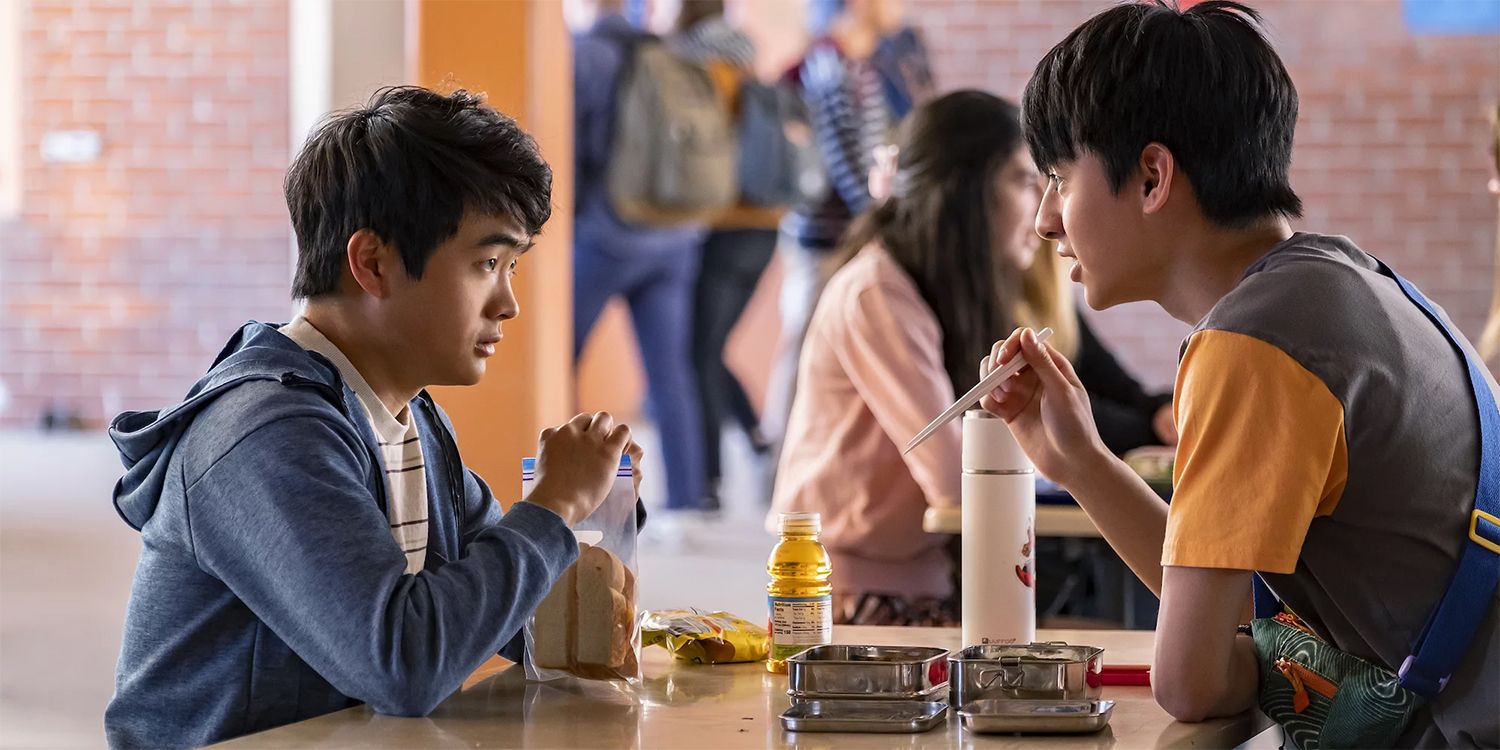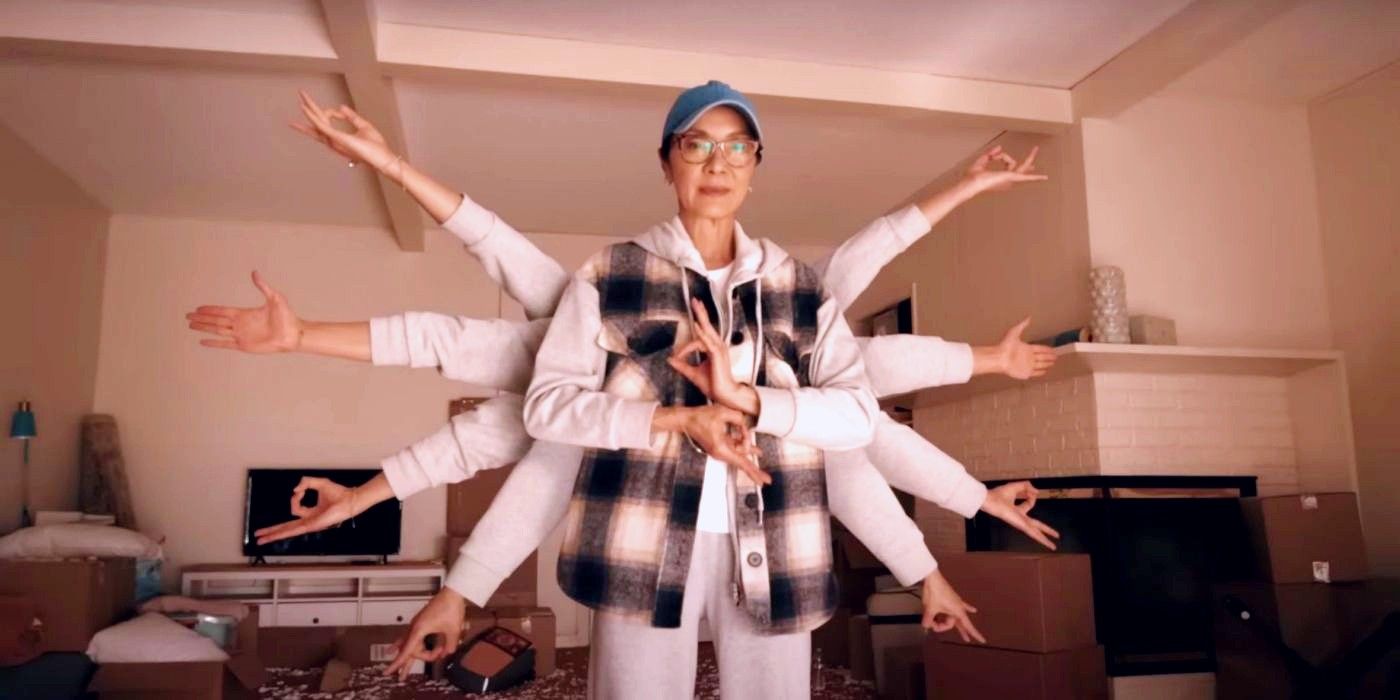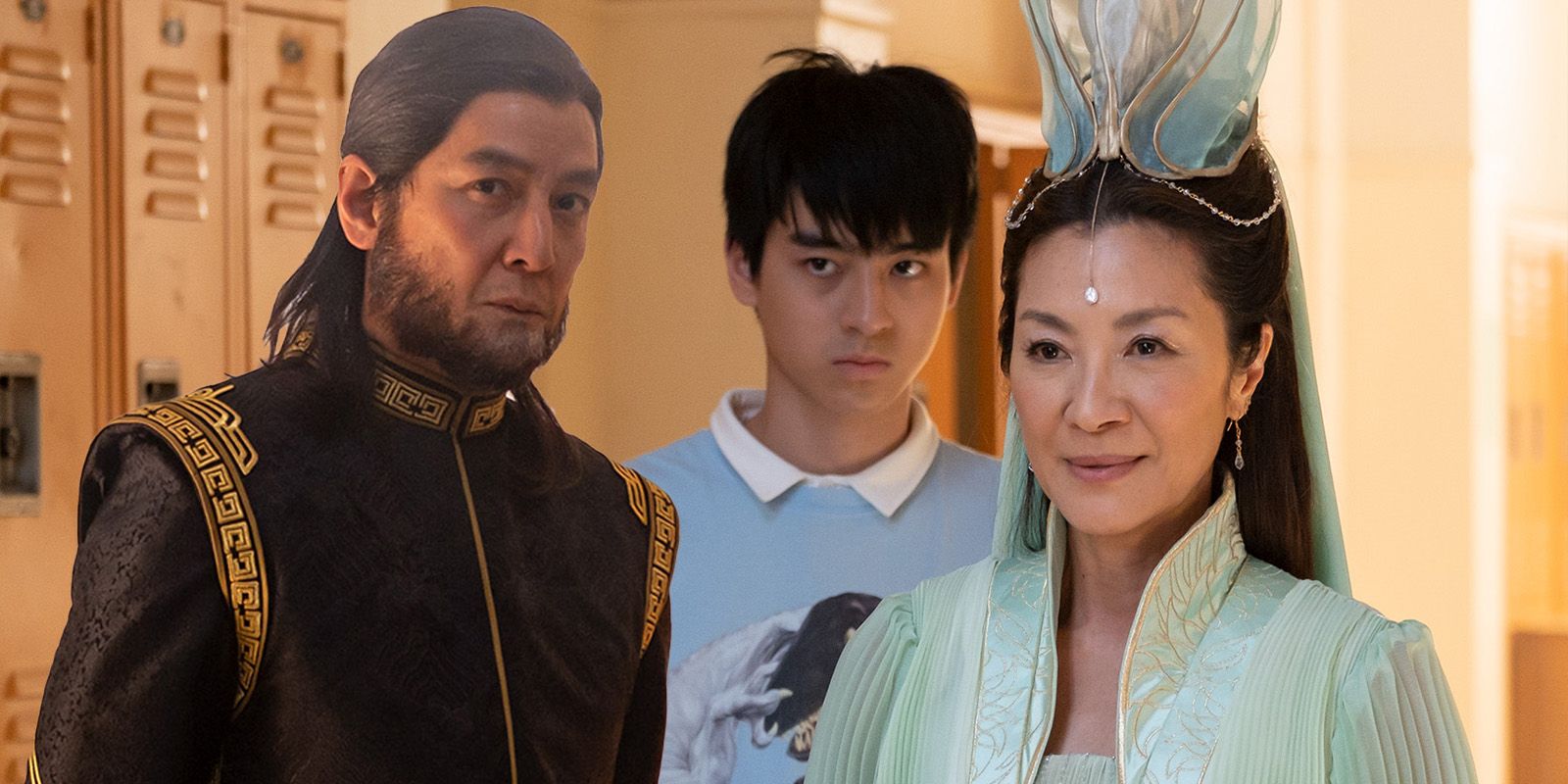Disney+'s upcoming series American Born Chinese, which premiered at the SXSW Film & TV Festival last month, will be making its way to the streaming service on May 24. Based on Gene Luen Yang's award-winning graphic novel by the same name, the supernatural show follows meek high schooler Jin Wang as his life turns upside down thanks to a burgeoning friendship with the new foreign exchange student, Wei-Chen. Soon, he finds himself caught in the middle of an epic struggle between various Gods of Chinese mythology.
With both Shang Chi's Daniel Destin Cretton and Lucy Liu directing episodes, American Born Chinese boasts an impressive list of Asian talent both in front of and behind the camera. The series was created for television by Kelvin Yu (Bob's Burgers) and stars Ben Wang as Jin, Yeo Yann Yann as his mother Christine, Chin Han as his father Simon, Jim Liu as Wei-Chen, Daniel Wu as Sun Wukong, and Sydney Taylor as Amelia. Several cast members from Best Picture winner Everything Everywhere All at Once also appear as Gods or television characters, including Michelle Yeoh as Guanyin, Ke Huy Quan as Freddy Wong, Stephanie Hsu as Shiji Niangniang, and James Hong as Jade Emperor.
Screen Rant spoke to author Gene Luen Yang, showrunner Kelvin Yu, producer Melvin Mar, and stars Ben Wang, Chin Han, Daniel Wu, and Sydney Taylor at SXSW. The team shared the long process of turning American Born Chinese into a series, the kismet casting choices they made, and how Ben's arc compares to Hamlet.
Cast & Creators on American Born Chinese at SXSW
Screen Rant: How did American Born Chinese become a television show? Who had the first idea?
Melvin Mar: Well, I read the book in 2006, and that was the start of hearing from Gene's publisher that he was not interested.
Gene Luen Yang: Still not. [Laughs] The lawsuit's still going on. We were not supposed to do this.
Melvin Mar: But about 10 years later, we met at a panel, and we had a good time. We kind of hit it off, and then he called me a little while later and said, "I think I'm ready to do this. Are you interested?" I'm like, "Yeah, it's been 10 years." That's when we started. We made a deal for Gene at Disney, and then we set out to find a writer.
I met Kelvin at a different panel – those panels worked out for me. I said we should just put all this together, and here we are at a panel.
Why were you so against it at first, Gene?
Gene Luen Yang: The book came out in 2006, and I think there was resistance from both sides. There was resistance from Hollywood towards stories that had Asian American protagonists, and then there was internal resistance in me too. I was specifically freaked out. I have a character called Cousin Chin-Kee in the book, who is an amalgamation of all of the negative stereotypes that I grew up with as a kid. I was freaked out that if it was ever adapted, clips of that character would show up on YouTube completely decontextualized, and it would be a nightmare. I just didn't want to do that.
Early on, I actually did get a little bit of interest from a major studio. When I pushed on it, I realized that they were interested because the Beijing Olympics were coming up and they wanted something with the word Chinese in the title to coincide with that. After that, I was like, "these Hollywood people", you know what I mean? I was freaked out about it, and then eventually I met Melvin, and then Kelvin gave a solution to that fear that I had. I was like, "Oh, that's actually very smart," so we ran with it.
Kelvin, what was that solution, and why were you the right choice to adapt American Born Chinese?
Kelvin Yu: The adaptation of the book required three big things. One was updating it to the present day because the book actually takes place vaguely in the '80s and '90s. Then, the structure of the book is very unique and important to the book, but you can't necessarily just ship that over to TV. Third, the problem of Cousin Chin-Kee.
Just to specifically answer that: as an actor, my first role was a problematic role. I played a high school nerd named Freddy Gong. The short of it is, “What if we took the problematic conversation around Cousin Chin-Kee and just put it in the show, and we just owned it?” We made Cousin Chin-Kee a TV character from the '90s that was problematic, so we could just talk about it on screen. That was the solution that we came up with, and it's worked out pretty well. Then we found Ke Huy Quan.
Everything Everywhere All at Once hadn't come out yet, so when we met him, it was a very different thing. We got front-row seats to this whole incredible, much-deserved ride. But the planets lined up, from the audiences and the streamers getting on board to us being ready for the right moment.
It does feel like the planets lined up, especially with so many actors from Everything Everywhere All at Once in it. Was there a connection there, even though it hadn't come out yet?
Kelvin Yu: I think little by little there was. It was Shang Chi at first, because Destin Daniel Cretton came on board, and then he made a call to Michelle [Yeoh]. But Ke was really an independent choice that Melvin brought to the table.
Melvin Mar: I met Ke three years ago now – in the middle of the pandemic, actually. He was trying to figure out if he was going to act again, and I was in the middle of casting Doogie Kamealoha. We were going with Jason Scott, so it was a sort of general meeting. His agent was like, "He knows that you're casting somebody else, but he's trying to figure it out. Would you just have a conversation with him?". I said sure, and we ended up talking for three hours over Zoom. I was like, "I love this guy."
Seeing Indiana Jones as a kid changed my life, so we left that just going, “We have to find something to do together at some point. I don't know what it is.” Then this came together.
Ben, Jin is the perfect reluctant hero to the point where I'm like, "Is this man going to stand up and fight? Is this going to happen?" How eager were you to get into that role, and what can you say about his arc over the season?
Ben Wang: I was so eager to do it, partially because I recognized right away how familiar this character was to me. A lot of character actors like being things that they're not. But for me, I have never really seen a character that was like me before. Getting an audition like that was very rare, and I really wanted to do it.
He gets less reluctant. He actually does some stuff.
Kelvin Yu: I'm trying to keep him the same. That was really my goal.
Chin Han: It's Hamlet. It's the Hamlet arc.
Ben Wang: Yeah, it is definitely about Jin figuring out who he is and taking a look at who he thought he wanted to be. He’s moving to a place where who he wants to be is really closer to a version of himself than some nebulous thing that he doesn't understand.
Amelia is very nice, but she’s also kind of in a bystander position. What does she really feel about Jin and the way he's treated at school?
Sydney Taylor: She's definitely in a bystander situation, but I think that as the story goes along, it's definitely written for her story develops a little bit more. And she represents a general 15-year-old kid who struggles with things that everybody does, but keeps up a really nice front and is nice to everybody.
She’s just the cute girl at school, and then in one episode we follow her home and see that she deals with things that everybody else does; with her parents and her siblings and her own personal feelings. And her feelings for Jin, whatever those might be. I think she's one of those characters that is written to be relatable. Her fronts are put up for a reason, but it's okay to let those come down every once in a while, especially when you meet a nice friend.
Simon has kind of a parallel story to his son in that they both need to stand up. What do you think is holding him back, and what has put him in this position?
Chin Han: I think anytime someone finds himself in a foreign situation or foreign environment, there are these growing pains, so to speak. I think trying to be the model father; trying to be the model husband, and trying to be the model worker takes a toll on this particular character. He finds his will shrinking, basically.
With the intrusion of all these mythological gods, it parallels his son's breaking free from these limitations. That is the parallel, and that's why I think the arc of this particular character is very satisfying as well. When I first read the script, I thought, "Hamlet." That makes the character very interesting to play. But I have to give credit where credit is due, and the role has been really fun because of the co-stars as well. Yeo Yann Yann, who's not here, is phenomenal in this. And, of course, my son who I'm so proud of.
Daniel, you're obviously a martial arts hero. You have done plenty of action roles yourself. How far removed are you from the Monkey King? What is your way into that?
Daniel Wu: Well, I think we're different species. [Laughs] And I can't really fly through the air, but I like this version of the Monkey King. The character of Monkey King is ubiquitous throughout Asian culture. Every kid grew up with this, so everyone knows him. But what we're seeing in this one is a different version, where he is a little more mature. He's 3000 years older, and he is a father now, so he's dealing with new kinds of issues.
Whereas in the original Journey to the West story, which we do get to see in episode 4, he's a rambunctious, young, rebellious character. That's how everyone knows him, but here we see him after he's gone through some stuff. He's got responsibilities now, and he's got this rebellious son running amok who is a reflection of himself as a younger person as well.
He sees that he's trying to control him, but he also sees himself in this kid. He’s stuck between controlling him or not controlling him; letting him be himself or making him form into something that he's not. That's what happened to him as a kid, as well, so he's struggling with that. It's interesting, and it really parallels Chin Han and Ben's characters in that family relationship as well. It's a mirror thing where you have the mythological version and the real-world version of it.
Also, in my real life, I'm a father now also. And so, I really relate to those issues. My daughter's 9 years old now. I wish her to be a certain way, but she's not, and you’ve got to let her be herself. I was going through similar issues at the time, and it made a lot of sense to me that I understood where to go with this character pretty much right away from reading it.
Final question, compliment hour: Jim Liu as Wei-Chen. Best character in the world. Who would like to talk about how great he is, and how was he cast?
Ben Wang: I'm sick of hearing how great he is. [Laughs]
Melvin Mar: We found Jimmy Liu in Taiwan. He was on a series there, but he's sort of a discovery. He's not a massive star, and we actually had to fight to get him over here. It's not the easiest thing to cast an international actor in the middle of a pandemic.
It's hard to explain how important not only Jimmy, but Ben and Jimmy's dynamic, was. But if we didn't have that, we're dead in the water. The whole show, movie stars aside, revolves around them. That's the heart and soul of the whole thing.
Kelvin Yu: Yeah, they were the first two pieces, I remember. Then we saw them together, and it clicked.
Melvin Mar: Yeah, because the show's a conversation about confidence. You have one character who's overconfident and jumping off waterfalls, with another character who's underconfident and mumbles his way through each episode. And I can't emphasize enough how much each of these actors is a bullseye. Every single person at this table, and everyone not here, is right on point. It's been a real blessing, and it's a credit to Gene's book. Because you don't get those people if you don't have that starting point.
About American Born Chinese
Jin Wang starts his sophomore year, hoping to make the soccer team and "level up" his social status, all while impressing his crush. But his plans are derailed when he's assigned a new student "shadow" from China named Wei-Chen Sun. At home, Jin’s parents Simon and Christine argue over Simon’s job. Meanwhile, Sun Wukong, the Monkey King, searches for his magical Iron Staff, which has been stolen.
Check out out other American Born Chinese interviews here:
American Born Chinese premiered on March 15 at SXSW, and it will be available to stream on Disney+ on May 24.



